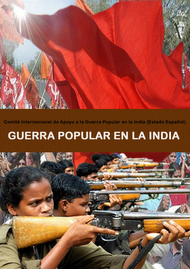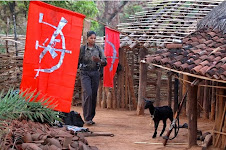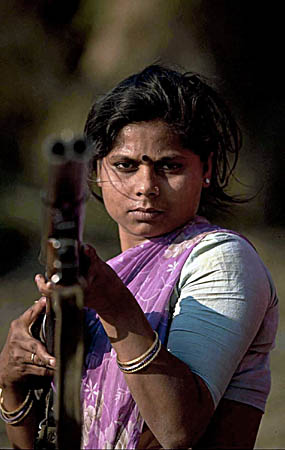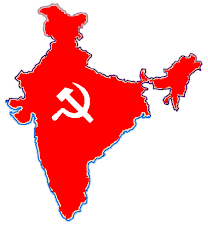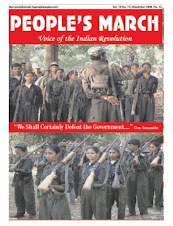By Rama Devi and Tangella Sudarshana
(Sruthi and Vidyasagar Reddy, two members of the CPI(Maoist), were brutally killed by the police on September 15, 2015, in what has been described as the first fake encounter in the newly formed Telangana state. Below we publish the reminiscences of Rama Devi and Sudarshana, Sruthi’s parents, about how their daughter grew up to be a fighter for the people and a martyr. The article has been minimally edited. Eds.)
At a time when the youth are craving for securing software jobs and earning US dollars, our second daughter Sruthi, a student of M.Tech, showed an inclination to think about the oppressed people of society and decided to take part in the peoples’ struggle for an equitable society.
She did not just dream of a better society but tried to work for making it a reality as well. I, father of Sruthi, have been a government teacher since 1989. As a teacher, I became a member of the then APTF (Andhra Pradesh Teachers Federation) and took part in all the meetings and seminars conducted by it. In the process I gradually developed societal understanding and shared the same with my family members from time to time. In the process of my consciousness being developed, I also joined RWA (Revolutionary Writers Association, Virasam) as a member in the year 1996. Since then I gradually involved my family members in the revolutionary cultural practice. As a result, progressive ideas have been inculcated in our family members. As a responsible teacher, I used to write and sing several progressive songs on the stage during educational meetings. Our daughters, mainly Sruthi, also used to sing songs frequently.
At the age of just 8 years, Sruthi sang a song “Karumabbullo kammipoyina chinnari chellamma” on the occasion of International Womens’ Day conducted by the teachers organization in Warangal in the year 1999. She gradually developed her social understanding and consciousness. She used to take interest in discussing the atrocities and violence perpetrated against women in society. Though Sruthi studied in an ordinary government school, she could secure 80% marks in her examinations. She was inclined to lead a simple, ordinary life without any ostentation of jewellery. She would even discuss with the family the root causes of poverty and inequalities among the people in society.
She would always show sympathy for the poor people and intend to do something for them. When I, as a convenor of RWA Warangal, was arrested by the Warangal police in 2001, the ill treatment meted out to me by the police moved and influenced my daughters a lot. My withstanding the police repression made a profound impact on our children, especially Sruthi. It made her think deeply about society. My life partner Rama Devi is a member of CMS (Chaitanya Mahila Sangam), Warangal. As part of the Sangham programme, she visited some slum areas in Warangal and learned about the miserable lives of women both inside and outside the family. Soon after coming home she used to discuss the plight of women within the family and ways of solutions to their problems. In the process Sruthi came forward to work for CMS in Warangal. It was the time when the Telangana movement started.
Within no time Sruthi jumped into the movement, and took part in almost all the activities held in the district of Warangal. She also sang songs of Telangana in rallies and meetings. As part of the CMS programme, she, along with other members, visited the girls’ hostels in Warangal and learned about their problems. She gave a call to them to struggle unitedly for the better life of women in society. She also became a member of the cultural wing of the organization and worked with deep commitment. She was indeed an inspiration to members inside the organization and people outside it. When an honest woman constable named Rajani was molested and murdered by the police in the headquarters of Jangaon, Warangal, Sruthi was moved a lot. She was perturbed at the way the incident was distorted as a suicide. She participated in the agitation launched by the organization and questioned the police system and demanded severe punishment for the culprits. She prepared a skit on the incident and staged its performance.
By reading the revolutionary literature available at home, Sruthi strengthened her revolutionary ideas. She participated in the funeral procession of Puvarthy martyrs, Com. Sudhakar and Com. Pushpa. Not only that, the murder of Com. Ganti Prasadam also moved her a lot. She even took part in is funeral procession. She could not digest the ghastly murders of honest and selfless people by the exploitative government. Like all others, she expected that newly elected Telangana government would solve the peoples’ problems. But the CM, K. Chandrashekar Rao did not utter as single word about Polavaram. He did not react against the separation of eight mandals of Khammam and their merger with Andhra Pradesh.
She took part in the Polavaram foot-march organized from July 1 to July 15, 2014. She faulted Chandrashekar Rao for being silent when the lives of lakhs of adivasis are at stake. She wondered at the childlike innocence of adivasis when she went to meet them. She felt that the Telangana government will not do anything for the farmers, unemployed and adivasis. She was also upset at the way the central government was unleashing terror on adivasis in Chhattisgarh, Odisha and Andhra Pradesh in the name of Operation Green Hunt. She came to understand that the so-called Green Hunt is nothing but a ploy to evict the adivasis from their places and give them away to the multinational companies like Jindal and Vedanta for plundering the mineral wealth of the forest areas of the country.
Sruthi’s political consciousness reached a crescendo and she decided to join the revolutionary movement of Maoist party to work for the realization of democratic aspirations of the people in Telangana. By joining the Maoist party, Sruthi transformed into a “peoples’ daughter/child”. As a member of KKW (Karimnagar-Khammam-Warrangal Committee), she educated the people about the ghastly tactics of the Telangana government. In the course of working for the people of Telangana, both comrades Sruthi and Vidyasagar Reddy were nabbed by the police, tortured inhumanly and murdered. By this fake encounter the real nature of K Chandrashekar Rao and his fascist mind was exposed to the public.
The inhuman police never showed any mercy towards Sruthi, an innocent woman fighter. Her hands were broken and her body was penetrated by the bayonet. Acid was poured over her private vital parts and she was at last inhumanly killed by the police. Even after two months no case was filed against the police who have resorted to fake encounter of Sruthi and Vidyasagar Reddy. Though more than 370 peoples’ organizations and parties have demanded for judicial enquiry by a sitting judge, the Telangana government has not taken any measures in this regard. So we request the people to make a note of the arrogant and fascist attitude of KCR (K Chandrashekar Rao) and teach him a fitting lesson in the days to come.
With revolutionary salutes, Rama Devi & Tangella Sudarshana Warangal.
--------




























